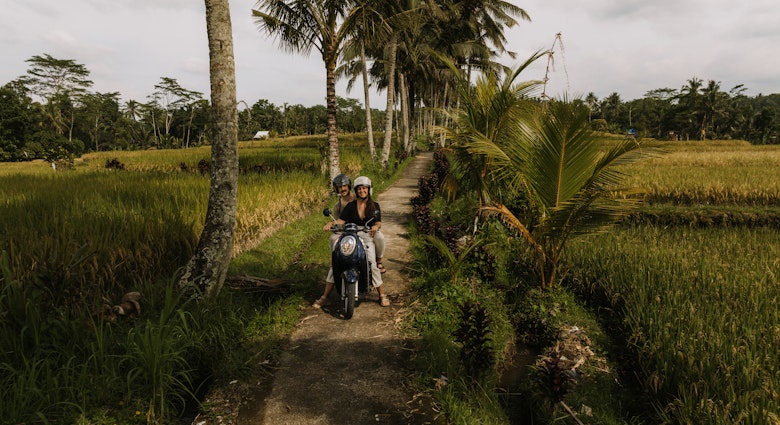

Bicycling is one of the best ways to navigate the Gili Islands © Manuel Sulzer / Getty Images
There are no cars or motorbikes on the Gili Islands, and this is one of the many charms of this trio of tiny isles off ³¢´Ç³¾²ú´Ç°ì’s northwest coast. In fact, all fossil fuel vehicles are steadfastly banned by local government ordinance. Most of the locals and visitors agree this is a good thing as there is no air pollution or traffic noise. There are few destinations in the world where you can completely escape from motorized traffic, so relish the peace.
That said, there are a few different transport options on and between the islands – here's our guide to getting around the Gili Islands.
Pedal your way around
With no traffic to hamper your progress, a bicycle is by far the most popular way of getting around. This economical and independent means of transport allows you the freedom to move comfortably at your own pace, stopping whenever you wish to admire the view or take photos. The narrow concrete or sand-&-dirt-packed roads are rough and potholed in places, but at least they’re flat. On the northeastern side of Gili Trawangan, the track gives way to loose, soft sand for about 50yd/m and you’ll have to carry your bike. Many of the hotels offer bicycle rentals, with prices ranging from 50,000 - 100,000Rp per day, making it an affordable way to explore each island.
A cyclist’s tips for renting a bicycle
Not all bikes are in good condition, so examine the tires and do a test drive to check the brakes and gears. Ideally, rent one with a headlamp.
Rentals are available all over the islands but we recommend renting directly from your lodgings so you don’t have to worry about returning the bike to some other rental business before you check out. Don’t want to commit for a whole day? Some businesses offer hourly rentals.

Climb aboard a horse-drawn cart
Horse-drawn carts, locally known as cidomo (chi-do-mo) are the traditional form of public transport on the Gili Islands, providing a vital role within the community. They are used by the locals to carry goods and also to transport visitors and their luggage. Using a cidomo may be helpful when you arrive and depart your hotel with your luggage. The cost varies depending on how far you’re going. It’s important to agree on the price before you leave with a bit of friendly bargaining. Expect to pay at least 100,000Rp, and consider limiting the load to two people plus baggage. The horses wear bells so you’ll hear them coming.
What you need to know about the horses
The tough little horses are a way of life on the Gili Islands and part of the local communities’ cultural heritage. Over the years, cidomo drivers have had a lot of bad press about the conditions of their horses, and this has been controversial issue for many tourists. Since 2015, however, the horses have been much better cared for thanks to non-profit organizations and , which have worked tirelessly to improve the welfare of the islands’ horses. The organizations provide care education and free basic healthcare for the animals ongoing projects include free clinics manned by international vets who volunteer their time and expertise, as well as a grassroots program for children that them how to care for horses from a young age. Stud Horse Riding & Rescue on Gili Trawangan provides a forever home for rescued and retired ponies, and it trains local farriers on better techniques.
For a speedy alternative, rent an electric scooter
Since 2022, a new means of transport has manifested in the form of electric scooters, an initiative made possible by the solar power plant on Gili Trawangan. Available for rent at some hotels, the cost ranges from 250,000 to 350,000Rp per day, or they can be hired by the hour.
Be considerate, though: the scooters are silent, so pedestrians and cyclists won’t hear you coming up behind them.

Put your best foot forward
The diminutive size of each island means that you can easily get around by foot. It takes about two hours to walk around Gili Trawangan, and only an hour to walk around Gili Air or Gili Meno. You can circumnavigate each island via a coastal track. If you plan on walking after dark, make sure to bring a flashlight as there are almost no street lights.
Tip for a birds-eye-view
Take a walk up Bukit Trawangan, the hill in the middle of Gili Trawangan. It’s 259ft (79m) above sea level and houses the remains of a Japanese WWII machine-gun bunker. From the top you can see all three islands and beyond, to Lombok and even Bali on a clear day.
Take the public ferry or speedboat to travel between islands
To get from one island to another, the public ferry is the way to go. It costs 35,000/40,000Rp and runs twice a day, departing Gili Air at 8:30am and 3pm; departing Gili Meno at 8:45am and 3:15pm; and departing Gili Trawangan at 9:30am and 4pm. Speed boats cost 85,000Rp for a one-way trip and typically leave every 30-45 minutes – or at least eight times per day – between 8am & 5pm. There’s a ticket office at each island-harbor.
If you're traveling during high season, be sure to get to the ticket office with plenty of time to spare to ensure you get a seat.

Charter a boat to from one island to another
It's possible to book a private charter, which is officially priced at around 500,000Rp. Head's up: after your charter has been agreed, local people may jump aboard free of charge. Etiquette is important here, so smile and suck it up.
Do not attempt to swim between the islands
The distance is short but the currents are deceptively strong, and a fair number of people have drowned while trying.
Accessible transportation on the Gili Islands
The boats and the cidomo carts are not wheelchair accessible and the island tracks are rough but, as with everywhere in Indonesia, you can always count on human kindness to help you find a way forward.
Keep planning your trip to Indonesia:
Conquer logistical challenges with How to get around Indonesia – tips for smooth island-hopping
Top up your Vitamin D with Indonesia's 11 best beaches
Stay informed with 15 things to know before going to Indonesia: culture, etiquette and safety
Build your perfect itinerary with The 10 best places to visit in Indonesia
Explore related stories

Destination Practicalities
Visiting Bali? Follow these 13 tips to ensure your trip runs smoothlyDec 18, 2024 • 7 min read









